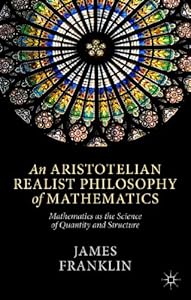 James Franklin offers insights from a new theory of Aristotelian realism at Aeon, and a new book:
James Franklin offers insights from a new theory of Aristotelian realism at Aeon, and a new book:
Aristotelian realism stands in a difficult relationship with naturalism, the project of showing that all of the world and human knowledge can be explained in terms of physics, biology and neuroscience. If mathematical properties are realised in the physical world and capable of being perceived, then mathematics can seem no more inexplicable than colour perception, which surely can be explained in naturalist terms. On the other hand, Aristotelians agree with Platonists that the mathematical grasp of necessities is mysterious. What is necessary is true in all possible worlds, but how can perception see into other possible worlds? The scholastics, the Aristotelian Catholic philosophers of the Middle Ages, were so impressed with the mind’s grasp of necessary truths as to conclude that the intellect was immaterial and immortal. If today’s naturalists do not wish to agree with that, there is a challenge for them. ‘Don’t tell me, show me’: build an artificial intelligence system that imitates genuine mathematical insight. There seem to be no promising plans on the drawing board.
The standard alternatives in the philosophy of mathematics have failed to account for the simplest facts about how mathematics tells us about the world we live in – nominalism by reducing mathematics to trivialities, and Platonism by divorcing it from the world, the real world of which mathematical truths form a necessary skeleton. Aristotelian realism is a new beginning. It connects the philosophy of mathematics back to the applications that have always been the fertile ground from which mathematics grows. It has a message both for philosophy and for mathematics and its teaching: don’t get blinded by shuffling symbols, don’t disappear into a realm of abstractions, just keep an eye fixed on the mathematical structure of the real world. More.
Follow UD News at Twitter!
